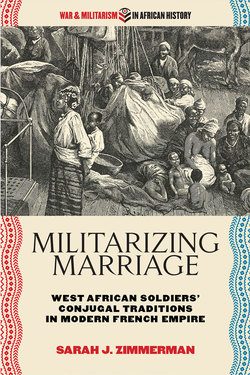Militarizing Marriage

Реклама. ООО «ЛитРес», ИНН: 7719571260.
Оглавление
Sarah J. Zimmerman. Militarizing Marriage
Отрывок из книги
MILITARIZING MARRIAGE
SERIES EDITORS: ALICIA C. DECKER AND GIACOMO MACOLA
.....
The tirailleurs sénégalais and their households were protagonists in an international colonial enterprise stretching from West Africa to Southeast Asia. African and other colonial soldiers have become a means through which to appraise and critique nineteenth- and twentieth-century colonialism. Histories of African soldiers are often geographically limited to a single colony, interrogate the history of a single ethnolinguistic group, or focus on the colonizer/colonized binary. The historiography of African soldiers widens out at the world wars.53 African veterans of these global conflicts have featured in twenty-first century controversies concerning the legacies of colonialism, which has inspired historians to investigate tirailleurs sénégalais’ place within transnational public history and collective memory. Images of soldiers on popular French breakfast cereals, the haunting iconography of war, and the Thiaroye Massacre are flash points that prompt questions about France’s debt to its African veterans and African countries formally colonized by France.54 This rapt attention to ten years of tirailleurs sénégalais’ history blinkers us to the colonial institution’s longevity and its importance in shaping French Empire for more than a century. Militarizing Marriage joins the work of other scholars who have recently begun to acknowledge the importance of West African soldiers’ participation in building and defending empire.55
Tirailleurs sénégalais’ lived experiences, their conjugal partners, and their families tell us much about the nature of colonialism. From the perspective of military households, we can query the theoretical constructions of colonial binaries, intermediaries, and the boundaries of subjecthood. Historians have identified indigenous African employees as social actors and colonial intermediaries in order to complicate interpretations of imperial power that rely on dichotomies like colonized/colonizer, subject/citizen, or African/European. Scholarship on intermediary concepts and actors has tended toward the historicization of men due to the gendered nature of colonial education and employment. The female conjugal partners of tirailleurs sénégalais provide an opportunity to examine women’s contribution to the articulation of colonial governance, economies, and traditions. Military wives and households offer historians a means to address the ambiguous and inconsistent manifestations of gendered colonial power.56 Colonial rule’s daily operations would not have been possible without female and male colonial subjects who took advantage of the “new opportunities created by colonial conquest and colonial rule to pursue their own agendas even as they served their employers.”57 Tirailleurs sénégalais’ motivations to become members of the French colonial army were innumerable and complicated by individuals’ history and social context.58 Tirailleurs sénégalais could have been seeking autonomy from their elders, resources to build households, or the ability to defy the constraints of communal authority. The means through which female colonial subjects became soldiers’ wives were equally complex, with varying degrees of volition and consent. These women could have sought conjugal relationships with tirailleurs sénégalais in order to liberate themselves from the authority of their community, leave previous husbands, or for wanderlust.59 The social and material interests of colonized women and men making up military households influenced the articulation of French colonialism for a century.
.....